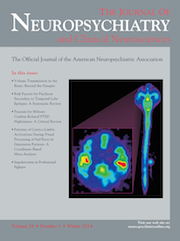Neuropsychological Outcomes After Psychosocial Intervention for Depression in Parkinson’s Disease
Abstract
The authors describe neuropsychological outcomes in people with Parkinson’s disease (PD) after their participation in an NIH-sponsored, randomized, controlled trial of cognitive-behavioral treatment for depression. Improvements in mood were associated with modest gains in verbal memory and executive functioning over the 10-week treatment period and accounted for greater variance in neuropsychological outcomes at the end of treatment than other known correlates of cognitive functioning in PD, such as disease severity, age, and education. Baseline working memory and executive skills were also associated with depression improvement over time.



